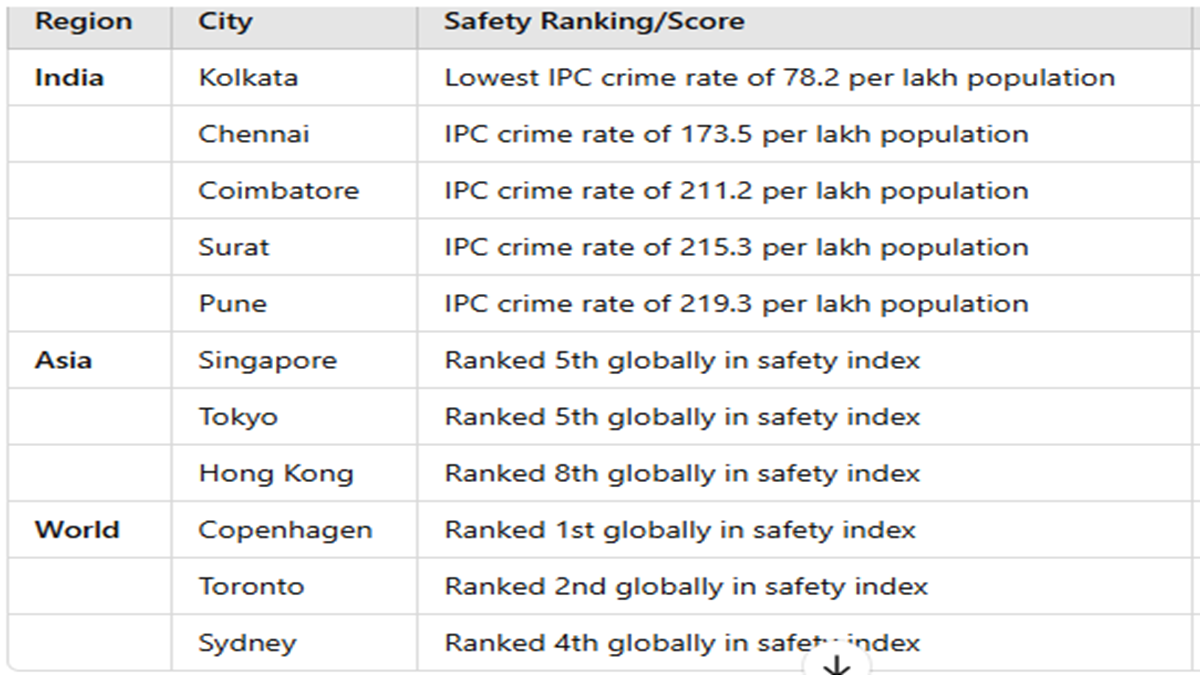Safety is a crucial factor when evaluating a city’s livability, influencing everything from economic growth to quality of life. A safe city provides its residents with low crime rates, efficient law enforcement, secure infrastructure, and well-maintained public spaces. In today’s fast-paced world, urban safety is determined by multiple factors, including crime statistics, road safety, women’s security, digital security, healthcare accessibility, and emergency preparedness.
In India, cities like Pune, Bengaluru, and Ahmedabad are often ranked among the safest due to their relatively low crime rates and well-organized law enforcement. Across Asia, metropolises such as Tokyo and Singapore lead the list, thanks to their advanced surveillance systems, low crime rates, and strict law enforcement. On a global scale, cities like Copenhagen, Zurich, and Helsinki consistently rank as the safest, offering high levels of public safety, efficient governance, and a strong sense of community.
This article explores the safest cities in India, Asia, and the world, examining the factors that contribute to their rankings. Understanding what makes a city safe can help individuals and governments work towards creating secure, resilient, and thriving urban environments.
Safest City in India
The safest city in India is often determined based on crime rates, law enforcement efficiency, women’s safety, and overall quality of life. Based on recent reports from the National Crime Records Bureau (NCRB) and other safety indices, Chennai, Pune, and Bengaluru are considered among the safest cities in India.
1. Chennai, Tamil Nadu
Chennai is frequently ranked as one of the safest cities in India, especially for women and senior citizens.
Low Crime Rate: Chennai has one of the lowest crime rates among metro cities in India. The NCRB data indicates that violent crimes are relatively low.
Strict Law Enforcement: Tamil Nadu police maintain strict vigilance, with advanced surveillance systems like CCTV monitoring.
Women’s Safety: The city has multiple women-only police stations, rapid response teams, and well-lit streets, making it safer for women.
Infrastructure & Connectivity: Well-maintained roads, a strong public transport system, and a coastal location make it a safe and convenient place to live.
2. Pune, Maharashtra
Pune is often ranked as one of the safest cities due to its educational and IT hub status.
Low Crime Index: Compared to other metro cities like Mumbai or Delhi, Pune has significantly lower crime rates.
Safe Public Spaces: The city has good law enforcement, well-lit streets, and active community participation in maintaining safety.
Youth & IT Professionals: Being an IT and education hub, Pune attracts a large number of students and professionals, maintaining a modern and secure environment.
3. Bengaluru, Karnataka
Bengaluru, India’s Silicon Valley, is known for its overall safe environment.
Tech-Savvy Policing: Bengaluru Police use AI-based surveillance, mobile apps, and technology-driven safety measures.
Women’s Safety Initiatives: Special police patrolling, women helplines, and Pink Hoysala (women safety squad) enhance security.
Expats & Multicultural Society: The city’s diverse population ensures greater community awareness and cooperation.
Other Safe Cities in India
Ahmedabad, Gujarat – Known for its strong law enforcement and relatively low crime rates.
Kolkata, West Bengal – Lowest rate of reported crimes among metro cities, as per NCRB reports.
Hyderabad, Telangana – Well-developed infrastructure and efficient policing make it a safe metro city.
Safest City in Asia
Check Safest City in Asia Pacific.
The Safest City in Asia – Tokyo, Japan
When it comes to safety, Tokyo, Japan consistently ranks as the safest city in Asia. According to the Economist Intelligence Unit’s Safe Cities Index, Tokyo has been leading in multiple safety parameters, making it a model of urban security.
Why is Tokyo the Safest City in Asia?
-
Low Crime Rate
- Tokyo has one of the lowest crime rates in the world.
- Strict law enforcement and an efficient judicial system contribute to its safety.
- Japan’s culture emphasizes respect, discipline, and social harmony, reducing criminal behavior.
-
Advanced Infrastructure & Disaster Preparedness
- Tokyo is prone to earthquakes, yet its state-of-the-art infrastructure ensures minimal damage and quick recovery.
- The city has strict building regulations and an early warning system for disasters.
-
Top-Notch Cybersecurity
- Tokyo is known for its high digital security standards, preventing cyber threats and fraud.
- The government and private companies invest heavily in data protection and cybersecurity policies.
-
Efficient Public Transport & Road Safety
- Tokyo’s public transport system (trains, buses, subways) is one of the safest and most reliable in the world.
- The city has strict traffic rules, reducing road accidents and ensuring pedestrian safety.
-
Excellent Healthcare System
- Tokyo has world-class hospitals and emergency services.
- Universal healthcare ensures that residents and visitors receive prompt medical attention.
-
Community Policing & Surveillance
- The Koban system (small neighborhood police stations) allows officers to monitor communities closely and assist citizens.
- High-tech CCTV surveillance enhances security in public spaces.
-
Hygiene & Public Health
- The city is exceptionally clean, with strict waste management policies.
- Public places, restaurants, and transport systems maintain high hygiene standards.
Other Safe Cities in Asia
While Tokyo is the safest, other cities also rank high in security:
- Singapore – Low crime, strict laws, and advanced digital security.
- Seoul, South Korea – Safe transport, high-tech surveillance, and strong law enforcement.
- Taipei, Taiwan – Excellent healthcare, low crime rate, and community policing.
- Hong Kong – Well-organized law enforcement and safe public spaces.
Safest City of World
Determining the safest city in the world involves evaluating various factors such as crime rates, healthcare quality, infrastructure resilience, and social cohesion. According to the Economist Intelligence Unit’s Safe Cities Index, Tokyo, Japan, frequently ranks at the top, achieving a high score of 92.
Key Factors Contributing to Tokyo’s Safety:
-
Low Crime Rates: Tokyo maintains remarkably low crime levels, attributed to effective law enforcement and a cultural emphasis on respect and order.
-
Advanced Infrastructure: The city boasts an efficient public transportation system and earthquake-resistant buildings, enhancing both daily safety and disaster preparedness.
-
Healthcare Excellence: Residents and visitors have access to high-quality medical facilities, ensuring prompt and effective healthcare services.
Other cities renowned for their safety include Singapore, Osaka, Amsterdam, and Toronto, each excelling in various aspects such as digital security, healthcare, and infrastructure.
Top 10 Safe City in the World
Determining the safest cities globally involves evaluating various factors, including personal safety, infrastructure, healthcare, and digital security. According to the Safe Cities Index (SCI), which assesses these dimensions, the top ten safest cities are:
-
Tokyo, Japan: Leading the SCI with a score of 92, Tokyo excels in digital security and ranks highly across other safety categories.
-
Singapore: With a score of 91.5, Singapore stands out for its top rankings in infrastructure and personal security, reflecting its robust urban planning and low crime rates.
-
Osaka, Japan: Scoring 90.9, Osaka is recognized for its leading position in health security and strong performance in other safety aspects.
-
Amsterdam, Netherlands: Known for its comprehensive safety measures, Amsterdam ranks highly in infrastructure and personal security.
-
Sydney, Australia: Sydney’s commitment to digital and health security places it among the top safest cities globally.
-
Toronto, Canada: Toronto’s emphasis on personal safety and robust infrastructure contributes to its high safety ranking.
-
Washington, D.C., USA: The capital city is noted for its strong digital security measures and emergency preparedness.
-
Copenhagen, Denmark: Copenhagen’s low crime rates and efficient public services enhance its safety profile.
-
Seoul, South Korea: Seoul’s advancements in digital infrastructure and health services contribute to its high safety ranking.
-
Melbourne, Australia: Melbourne’s focus on health security and resilient infrastructure secures its position among the safest cities.
These rankings reflect each city’s dedication to maintaining and improving various aspects of safety, ensuring a secure environment for residents and visitors alike.
FAQs
-
Which is the safest city in the world?
- The safest city in the world often varies depending on the ranking criteria, but cities like Copenhagen, Tokyo, Singapore, and Zurich frequently top global safety indexes.
-
What factors determine the safety of a city?
- Safety is measured based on crime rates, healthcare quality, digital security, infrastructure safety, personal safety, and emergency response efficiency.
-
Is the safest city also the most expensive to live in?
- Many of the safest cities, such as Zurich and Singapore, tend to have a high cost of living, but there are some safer cities with moderate living expenses.
-
How can tourists ensure their safety while visiting the safest cities?
- Tourists should still follow general safety measures, such as staying aware of their surroundings, securing valuables, and knowing emergency contact numbers.
-
Do the safest cities have low crime rates?
- Yes, the safest cities generally have low crime rates, strong law enforcement, and effective surveillance systems to ensure public security.
Releted Link:
Top 10 NGO of India
Top 10 Richest Persons in The World

